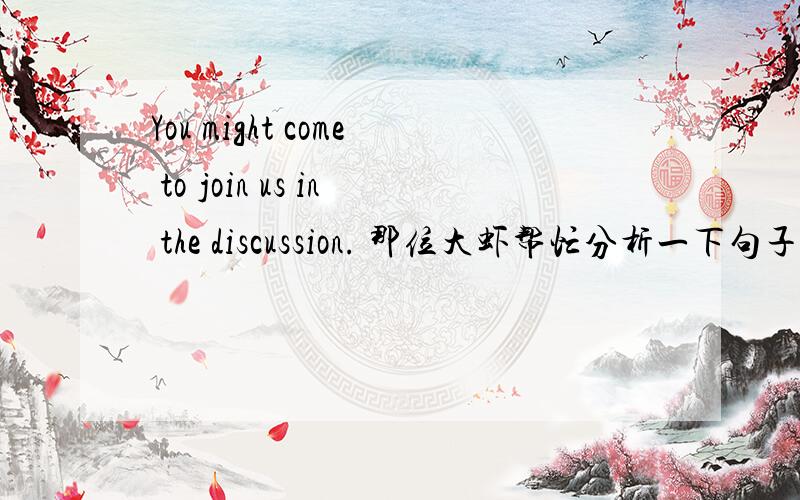You might come to join us in the discussion. 那位大虾帮忙分析一下句子成分?Thanks.重点在come to 与 join .
来源:学生作业帮助网 编辑:作业帮 时间:2024/07/31 01:54:06

x��Q�N�@����~���p���U�Z$�| ��bT0�Ą�јA@f�L���-MLܹp3�s��sΜ�fb�4G�ƪn�MkĦd�&�YO[�Ȋa�r�eP3B��
�����k��s�
��68��
�}6D������0�_��� \>�9s
5����|��h&���8�z�!��9�{�G�\T�q[�5��P�[bo_l�@e���J�"O�\A��6��J����C4r�{�C9m�nZ����K5��)�eu�P�N �8 �
���k��<�:}�(����
5�j��$��G�jx��4M
+�HR�N�Yö5�$��$�c�'65��Ym��
ѵ�F,�Li�p'�2�:����s�X�۬��
gw
��7�
L�[��G���}�ȓ{1�c�7Hz��EN
H�>
�BA9w�}�
�W�"
You might come to join us in the discussion. 那位大虾帮忙分析一下句子成分?Thanks.重点在come to 与 join .
You might come to join us in the discussion. 那位大虾帮忙分析一下句子成分?Thanks.
重点在come to 与 join .
You might come to join us in the discussion. 那位大虾帮忙分析一下句子成分?Thanks.重点在come to 与 join .
You might come to join us in the discussion.主语就不说了,谓语是might come,might是情态动词,come用原型;至于to join 是不定式结构嘛,这里用to是看动词come来决定的;in the discussion是状语来的,明白不?
whom is the book written by? when have you lived here since? 那么从句子成分方面分析,两个句子都是特殊疑问句,由正常的主谓宾组成 by 和since置
He said you.come to the party.A.can B.might C.need D.must
You might come to join us in the discussion. 那位大虾帮忙分析一下句子成分?Thanks.重点在come to 与 join .
英语翻译Brainstorming frees the mind to come up with creative ideas you might not otherwise have thought of.
WHEN YOU COME TO
If you had come earlier,you______him.(2 分)A.could meetB.might have metC.might meetD.might as well meet
___you happen to see Mary,would you please ask her to come here A would B could C should D might
I might even be able to come back to new york next summer为什么是might不是may
—Did Mary come to the party? —I don't know.She__while I was out.A.might have come B.might come 为什么不能选B
—Did Mary come to the party?—I don't know.She__while I was out.A.might have come B.might come为什么是A不是B
I think you might want to wrong,do you think?
Waiting for you to come
If You Come To Me
if you come to me
would you like to come?
You Come to Me 歌词
would you like to come
When did you come to
When did you come to